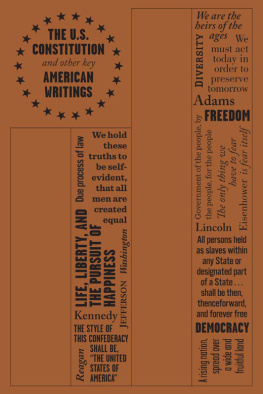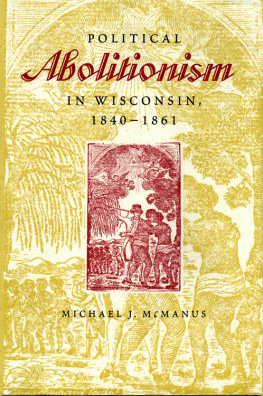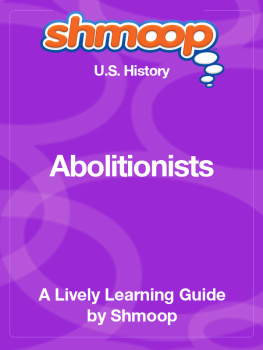CHAPTER I
The Spirit of the Age Two Classes of Abolitionists Their Objects The Sources of their Inspiration Influences upon Church and State Proposed Invasions upon the Constitution Effect upon the Slave States, &c., &c.
One of the commanding characteristics of the present age is the spirit of agitation, collision and discord which has broken forth in every department of social and political life. While it has been an era of magnificent enterprises and unrivalled prosperity, it has likewise been an era of convulsion, which has well nigh upturned the foundations of the government. Never was this truth more evident than at the present moment. A single topic occupies the public mind Union or Disunion and is one of pre-eminently absorbing interest to every citizen. Upon this issue the entire nation has been involved in a moral distemper, that threatens its utter and irrevocable dissolution. Union the child of compact, the creature of social and political tolerance stands face to face with Disunion, the natural off-spring of that anti-slavery sentiment, which has ever warred against the interests of the people and the elements of true government, and struggles for the maintenance of that sacred pledge by which the United States have heretofore been bound in a common brotherhood. Like the marvellous tent given by the fairy Banou to Prince Achmed, which, when folded up, became an ornament in the delicate hands of women, but, spread out, afforded encampment to mighty armies; so is this question of abolitionism, to which the present overwhelming trouble of our land is to be traced, in its capacity to encompass all things, and its ability to attach itself even to the amenities and refinements of life. It has entered into everything, great and small, high and low, political, theological, social and moral, and in one section has become the standard by which all excellence is to be judged. Under the guise of philanthropic reform, it has pursued its course with energy, boldness and unrelenting bitterness, until it has grown from a cloud no bigger than a mans hand into the dimensions of the tempest which is to-day lowering over the land charged with the elements of destruction. Commencing with a pretended love for the black race, it has arrived at a stage of restless, uncompromising fanaticism which will be satisfied with nothing short of the consummation of its wildest hopes. It has become the grand question of the day of politics, of ethics, of expediency, of justice, of conscience, and of law, covering the whole field of human society and divine government.
In this view of the subject, and in view also of the surrounding unhappy circumstances of the country which have their origin in this agitation, we give below a history of abolition, from the period it commenced to exist as an active element in the affairs of the nation down to the present moment.
ABOLITIONISTS AND THEIR OBJECTS.
There are two classes of persons opposed to the continued existence of slavery in the United States. The first are those who are actuated by sentiments of philanthropy and humanity, but are at the same time no less opposed to any disturbance of the peace or tranquility of the Union, or to any infringement of the powers of the States composing the confederacy. Among these may be classed the society of Friends, one of whose established principles is an abhorrence of war in all its forms, and the cultivation of peace and good will amongst mankind. As far back as 1670, the ancient records of their society refer to the peaceful and exemplary efforts of the sect to prevent the holding of slaves by any of their number; and a quaint incident is related of an eccentric Friend, who, at one of their monthly meetings, seated himself among the audience with a bladder of bullocks blood secreted under his mantle, and at length broke the quiet stillness of the worship by rising in full view of the congregation, piercing the bladder, spilling the blood upon the floor and seats, and exclaiming with all the solemnity of an inspired prophet, Thus shall the Lord spill the blood of those that traffic in the blood of their fellow men.
The second class are the real ultra abolitionists the reformers who, in the language of Henry Clay, are resolved to persevere at all hazards, and without regard to any consequences, however calamitous they may be. With them the rights of property are nothing; the deficiency of the powers of the general government is nothing; the acknowledged and incontestible powers of the State are nothing; civil war, a dissolution of the Union, and the overthrow of a government in which are concentrated the fondest hopes of the civilized world, are nothing. They are for the immediate abolition of slavery, the prohibition of the removal of slaves from State to State, and the refusal to admit any new State comprising within its limits the institution of domestic slavery all these being but so many means conducive to the accomplishment of the ultimate but perilous end at which they avowedly and boldly aim so many short stages, as it were, in the long and bloody road to the distant goal at which they would ultimately arrive. Their purpose is abolition, peaceably if it can, forcibly if it must.
Utterly destitute of Constitutional or other rightful power; living in totally distinct communities, as alien to the communities in which the subject on which they would operate resides, as far as concerns political power over that subject, as if they lived in Asia or Africa, they nevertheless promulgate to the world their purpose to immediately convert without compensation four millions of profitable and contented slaves into four millions of burdensome and discontented negroes.
This idea, which originated and still generally prevails in New England, is the result of that puritanical frenzy which has always characterized that section of the country, and made it the natural breeding ground of the most absurd isms ever concocted. The Puritans of to-day are not less fanatical than were the Puritans of two centuries ago. In fact, they have progressed rather than retrograded. Their god then was the angry, wrathful, jealous god of the Jews the Supreme Being now is the creation of their own intellects, proportioned in dimensions to the depth and fervor of their individual understandings. Then the Old Testament was their rule of faith. Now neither old nor new, except in so far as it accords with their consciences, is worth the paper upon which it is written. Their creeds are begotten of themselves, and their high priests are those who best represent their peculiar notions. The same spirit which, in the days of Robespierre and Marat, abolished the Lords day and worshipped Reason, in the person of a harlot, yet survives to work other horrors. In this age, however, and in a community like the present, a disguise must be worn; but it is the old threadbare advocacy of human rights, which the enlightenment of the age condemns as impracticable. The decree has gone forth which strikes at God, by striking at all subordination and law, and under the specious cry of reform it is demanded that every pretended evil shall be corrected, or society become a wreck that the sun must be stricken from the heavens if a spot is found upon his disc.










